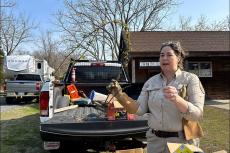The developer Harry Macklowe listed his Georgica Pond house last week for $38 million. Despite the legal costs Mr. Macklowe has accrued since 2019, when East Hampton Village first hit him with a stop-work order citing illegal clearing and improvements, he stands to make a tidy profit if he gets close to that number, having bought the property in 2017 for $10.35 million.
Thomas Preiato, the village building inspector, says there are 21 violations on the 2.71-acre parcel. Most relate to the village’s wetland code, which forbids clearing within 125 feet of wetlands. Georgica Pond has famously had challenges to its water quality, and overclearing hampers efforts to improve the health of the pond. Aerial photos show huge swaths of lawn today, where in 2017 and later, there were trees. In one place, sod leads right to the water’s edge.
According to the village’s Zoning Board of Appeals, Mr. Macklowe has also expanded on structures that were too close to wetlands, among them a stairwell, a patio, a retaining wall, a pergola, and a pool equipment enclosure. He applied for retroactive approval, but sued after his appeal was rejected. Last April, a Suffolk Supreme Court judge ruled for the Z.B.A., while asking the board to clarify the legality of certain other structures.
Billy Hajek, the village planner, did so in November, and at its Feb. 9 meeting, the board voted unanimously that the homeowner still needed approval for items that had been expanded beyond his original 2017 Certificate of Occupancy. (That determination will be filed at tomorrow’s Z.B.A. meeting.)
Originally, Mr. Macklowe was expected to appeal the latest ruling as well; however, with the house now on the market, he may leave the violations to the next owner.
However, “It’s buyer beware,” said Mr. Preiato. “We like the sellers to give the C of O to the new people, but that doesn’t always happen. In that case, the buyers also buy the problems, and there’s quite a few on this property. The C of O he has, doesn’t match with what’s on that property now.”
Once a house sells, it cannot be occupied by the buyers until a new, accurate certificate of occupancy is issued.
Mr. Preiato doubts that the Macklowe house is often occupied. “I haven’t seen much action down there,” he said. If Mr. Macklowe does use the property, he said, despite its current infractions, the village would not prevent it. “He has the right to use it, but he couldn’t occupy or use the new stuff,” said the building inspector. Macklowe Properties did not respond to an email seeking comment.
According to Mr. Preiato, Mr. Macklowe has cleared his land to “within a stone’s throw” of Georgica Pond. “He basically made his own beach.” A new owner will have a lot of re-planting to do, he said, before being allowed to move in, nor would a mere promise to replant be acceptable. “I could never authorize someone moving in before they cleared up the violations. That would be like me giving them a temporary variance for those items.”
How did Mr. Macklowe get away with such a large clearing and construction project in the first place? Mr. Preiato, who was not the building inspector at the time, explained that the house is surrounded by preserved land. “In the Building Department’s defense, when everything greens up in the spring, you can’t see in there. You really can’t.”
Indeed, the real estate brokers representing the property, Paul Brennan and Martha Gundersen of Douglas Elliman, highlight its seclusion in their sales listing. “This property is nestled into its own serene cove, and offers complete privacy situated on the shores of Georgica Pond with breathtaking sunset views.” Not only are there 5,500 square feet of living space, but 951 feet of linear pond frontage as well. Annual taxes, at $48,223, run just under the national average. Neither broker responded to emails requesting comment.
Mr. Preiato looks forward to putting this particular matter behind him. “I hope new owners clear up the violations and then, hopefully, paint it. It’s whiter than white, with a white roof.”
A clerk at East Hampton Town Justice Court said on Tuesday that the violations are “still open cases,” meaning that a judge has yet to hear them and assign fines.



